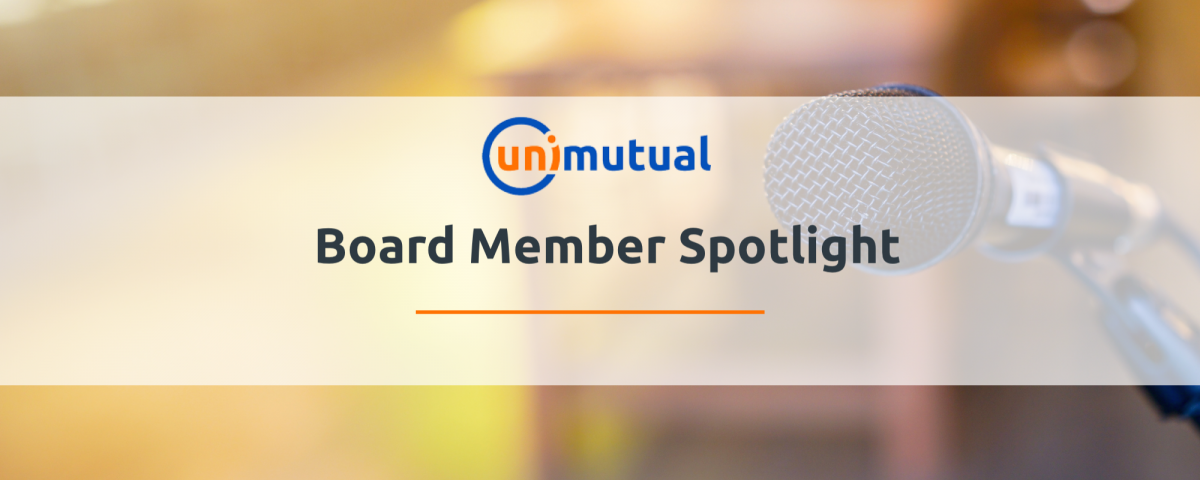
Cyber Risks: Phishing & How to Spot It
June 5, 2019
Risky Speech on Campus – Emerging Risk Report: Issue 82
June 21, 2019In these Spotlight discussions, we speak to the individuals that make up the Unimutual community, to share the experiences of the parts that make up the whole.

I’m Darren Greentree. I’m the Executive Director of Financial Operations at Western Sydney University. Western Sydney University has been a Member for over 25 years now and certainly enjoys the benefits of the Mutual.
Tell us about Western Sydney’s Membership…
Our decision to remain a Member is based on a number of factors, and contributing to that is the Mutual’s approach – a long-term approach to the sector. I think also the policy wording is very tailored to our needs – particularly around the areas of research – and also the intelligence and the interaction with the other Mutual Members contributes to a positive experience.
What made you decide to join the Unimutual board?
Well, given I’ve been responsible for Western Sydney University’s insurance matters for the last nine years, and I’ve been through thick and thin with the Mutual. We’ve had some good years and we’ve also had a major claim, which certainly opens your eyes to what the Mutual is all about. Now I feel it’s my opportunity to give back to the Mutual in terms of Board Membership.
What does it mean to Western Sydney to be a Member?
I think it’s twofold. We gain a lot from the Mutual in terms of shared knowledge, the interaction with other Members, and also the assurance that the Mutual is here for the long haul and is really geared up for the interests of the University and its Members. We tend to give back in terms of our experiences. Certainly, we contribute to all the forums and look forward to that engagement process and sharing some of our risk mitigation strategies.
What key differences set Unimutual apart?
We certainly do look to the private sector to benchmark, and we find that the Mutual offers a tailored approach to our risk and insurance needs – as opposed to being at the whim of the open market which certainly can see higher fluctuations compared to a mutual that shares common goals and also common risk factors.
When has being a Member made a difference?
We experienced a large fire in one of our primary buildings just prior to a graduation event, and certainly the Mutual stepped in and gave us the support that we needed immediately. We didn’t have to go through I suppose the justification process of the importance of a graduation, because the Mutual being very tailored to our sector knew exactly what pain we were feeling and understood that, and also supported us through that period.
The experience we had with the Mutual is that we had the event happen (and it was overnight): the next morning, we had assessors already on site and also the Mutual were there supporting us, making available funds and all their resources to help us get through. There was a lot of engagement between our capital works and facilities team and the Mutual, and that really made a difference. It was a positive experience in a very difficult circumstance.
What changes do you foresee for the sectors’ risks?
The sector is going through a lot of change – as are the risk profiles. You’re noticing that the sector now – whilst it is heavily focused on learning, teaching and research – also has a lot of commercial activities going on, and that brings a new risk regime to any organization. And the Mutual is partnering in terms of understanding those risks and also helping us put risk mitigation factors in place.
“The sector is going through a lot of change – as are the risk profiles. You’re noticing that the sector now – whilst it is heavily focused on learning, teaching and research – also has a lot of commercial activities going on, and that brings a new risk regime to any organization.”
What do you value most about being a Member of Unimutual?
Membership’s important and it’s something that you don’t take for granted. It’s important that an organization reassess the value of that Membership – and there is an interesting dynamic at play. You have the university with its own requirements and needs; you have the Mutual, where obviously the University is part of that mutual; and you have the brokers, who are really that independent advice.
There is a good competitive tension there. I see that that really is the driving force to making sure that the Members are getting the best opportunity and best benefits out of the Mutual, and that the Mutual is fully understanding of the Member’s requirements. We can’t forget: universities are about learning, teaching, and research. And the nuances of research and the risk factors – freezer damage, damage to research – [are] very hard to put dollar values on, yet the Mutual does accommodate those needs and is understanding.
What would the loss of an intangible asset mean to Western Sydney?
A lot of research material isn’t replaceable just by an insurance claim in terms of monetary value. You look at some of the biological samples that have been kept over decades, they just can’t be replaced. Certainly the Mutual has played a positive part in that in the terms of the risk mitigation, so freezer controls – in terms of backup power, the alarm systems, and also the methodology of shutting down over say a Christmas break and what steps should be taken to ensure that research material is protected.
That’s part of where the Mutual adds a lot of benefit. It constantly reminds the Members on good practices to ensure that if there is a loss, that that loss is reduced to a minimal amount or avoided at all costs.
“A lot of research material isn’t replaceable…You look at some of the biological samples that have been kept over decades, they just can’t be replaced. The Mutual has played a positive part in that in the terms of the risk mitigation.”
Why is being a Member of the Mutual important to you?
I think it’s important just to understand the value of a mutual, and certainly as I mentioned before, it’s important to reassess that value on a continual basis. But the Mutual is here for the longer haul – as are universities – so there is a time horizon matching between a university that is here generational, as is the Mutual, and it’s important to understand those nuances that are required, particularly around research and the material impact that has on the university if it can’t protect or mitigate risks associated with that.
It’s a changing environment. Our whole sector is changing, as is the nature of universities, and insurance and brokers need to keep up with that. And the Mutual tends to be that catalyst between the broker and the Member that enables that advancement – where certainly, when you look to the private sector you don’t necessarily get that in-depth operational understanding.
Do you think the insurance industry would be different if the Mutual didn’t exist?
I think it would. It adds a competitive dynamic to the sector. The private sector knows that the Mutual is there, and it’s in for the interests of its Members and also tailors its product. So therefore, that connection between the Mutual and the reinsurers and also the local insurers does add, I suppose, the next level of understanding. Otherwise, it would be more of a cookie cutter approach, which I fear would be to the detriment of universities, particularly around specialized research areas.
We previously spoke to Broker Partner, Barry Bernasconi – read his responses here.



